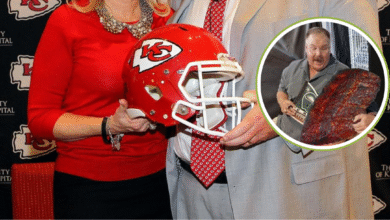Jason Kelce: The Time He Nearly Gave Up When No One Believed He Could Be an NFL Star
OPINION: This article may contain commentary which reflects the author's opinion.
At 22, Jason Kelce was nobody’s pick for NFL stardom. A walk-on at the University of Cincinnati, he wasn’t the towering, muscle-bound archetype coaches drooled over. Standing at 6’3” and barely 280 pounds, he was deemed too small, too slow, and too raw to dominate as a center. In 2006, his first year with the Bearcats, Kelce wasn’t even a starter—he was a backup linebacker, relegated to special teams, watching from the sidelines as his teammates took the field. It was a humbling start for a kid from Cleveland Heights, Ohio, who’d dreamed of gridiron glory since he was old enough to hold a football.
The weight room was Kelce’s personal hell. Cincinnati’s strength coach, Jeff Quinn, was relentless, piling on drills that pushed Kelce to his breaking point. One sweltering afternoon in 2007, during a grueling session of squats and sprints, Kelce’s legs buckled. He collapsed under a barbell, sweat pooling around him, as teammates snickered. Quinn didn’t let up. “You wanna quit, Kelce? Go home,” he barked. For a fleeting moment, Kelce considered it. He wasn’t on scholarship. He wasn’t a star. Why keep grinding for a dream that felt so far out of reach?
That night, alone in his dorm, Kelce stared at the ceiling. His body ached, but his pride hurt more. He thought about his parents—Ed, a steelworker, and Donna, a banker—who’d raised him to never back down. He thought about his younger brother, Travis, already showing promise as a high school quarterback. If he quit, what kind of example would he set? The next morning, Kelce dragged himself back to practice. He didn’t say a word. He just worked.
Slowly, things changed. Kelce’s work ethic caught the eye of head coach Brian Kelly, who saw potential in his grit. By 2008, Kelce was transitioning to center, a position he’d never played. It was a steep learning curve. He fumbled snaps, missed blocks, and took the heat for blown plays. But he studied film obsessively, learning the nuances of the offensive line. His intelligence—often overlooked because of his size—became his edge. By his senior year, Kelce was a starter, anchoring an offense that went 12-1 and earned a Sugar Bowl berth.
Still, the NFL wasn’t calling. Scouts dismissed him as undersized, projecting him as a late-round pick at best. In the 2011 NFL Draft, Kelce waited through 190 selections before the Philadelphia Eagles took a chance on him in the sixth round. It was a lifeline, but hardly a guarantee. His rookie year was a disaster. He barely played, buried on the depth chart behind veterans. Injuries nagged him—a sprained ankle, a tweaked knee—and whispers grew that he might wash out.
Kelce’s lowest moment came in 2012, during a preseason game against the Patriots. He missed a crucial block, allowing a sack that stalled a drive. Fans booed. Teammates shot him looks. Back in the locker room, he sat alone, head in his hands, wondering if he’d ever belong. But Kelce didn’t quit. He leaned on his family, his coaches, and his own stubborn belief that he could be more. He spent hours with offensive line coach Howard Mudd, refining his technique. He hit the gym harder, packing on muscle without losing agility.
By 2013, Kelce was the Eagles’ starting center. His quickness and football IQ made him a cornerstone of Chip Kelly’s fast-paced offense. He earned Pro Bowl nods, All-Pro honors, and, in 2018, a Super Bowl ring when the Eagles stunned the Patriots. That kid who’d collapsed in the weight room had become a legend, delivering one of the most iconic speeches in NFL history at the victory parade, dressed as a mummer and roaring with Philly pride.
Kelce’s story isn’t just about talent—it’s about refusing to let doubt win. Every snap he took was a middle finger to the naysayers who said he’d never make it. Today, as he mentors younger players and reflects on his career, Kelce doesn’t shy away from his failures. “Those moments when you wanna quit? They’re what make you,” he once said. For anyone chasing a dream, Jason Kelce’s journey is proof that the darkest days can lead to the brightest lights.



